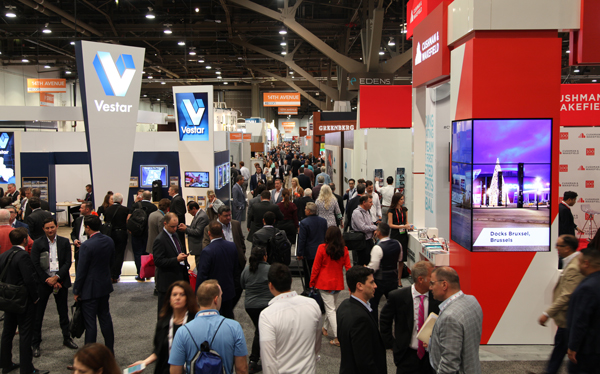
When thousands of retail buffs arrive at the Jacob K. Javits Convention Center in early December, they’ll have plenty to discuss — from the hottest up-and-coming neighborhoods to the rise of experiential stores as a way to combat e-commerce. Then, of course, there will be the elephants in the room: Manhattan’s sputtering retail market and major store closings across the country.
Still, attendees appear eager as ever to talk about these topics and more with their peers. At press time, 7,700 people had registered for the International Council of Shopping Centers’ annual NYC expo. But its organizers anticipate the final turnout will exceed 10,000 (on par with last year’s total).
The trade group has added a few new features to this year’s show, including an additional third day dedicated to educational sessions. Those panels — which will be held on Dec. 5 and portions of Dec. 6 and 7 — will focus on recent trends like the growth of pop-up shops and the latest technologies poised to disrupt commercial real estate. The remainder of the last two days will be reserved for networking.
 Jason Richter, principal of retail investment at advisory firm Capricorn Asset Management and former chair of the ICSC New York planning committee, said the annual NYC show hasn’t had a full day of sessions for the last six or seven years due to space constraints.
Jason Richter, principal of retail investment at advisory firm Capricorn Asset Management and former chair of the ICSC New York planning committee, said the annual NYC show hasn’t had a full day of sessions for the last six or seven years due to space constraints.
But this year, ICSC will take up about 34 percent more space than in 2016, having booked the convention center’s main exhibition hall on the third floor for a total of 260,000 square feet. That’s up from 175,000 square feet last year, while the number of exhibitors is expected to increase slightly to 517 from 500 in 2016.
One major retail player that isn’t joining the herd this year is Simon Property Group, according to industry sources. The country’s largest mall REIT will not exhibit at this year’s event, ICSC representatives confirmed, though it was not immediately clear why not. Representatives for Simon declined to comment.
And Taubman Centers, the fourth-largest mall REIT by market value, will keep its exhibit space but plans to hold most of its meetings during the event at its New York office, representatives told The Real Deal. A spokesperson for Taubman said that hosting meetings in its own space was more efficient.
It’s no secret that with the rise of e-commerce, brick-and-mortar retail revenues have plunged in recent years, leading to hundreds of store closures and the liquidation of several major chains across the U.S. At the same time, the online retail behemoth Amazon has upped its physical presence with the opening of two bookstores in the city and plans for a third. Traditional retailers are now finding new ways to adapt, such as cutting deals with landlords for more flexible leases.
“We see online shopping as an opportunity, not a threat,” a representative for ICSC said in a statement. “Consumers want options when making a purchase, and retailers who utilize omnichannel provide one more way for a consumer to make a purchase. Sessions will address this opportunity.”
This year’s keynote presentation will focus on the “ever-changing retail climate” and will feature Kyle Ashley, director of retail at the hipster eyewear purveyor Warby Parker; Barry Beck, co-founder and COO of the makeup and skincare company Blue Mercury; and Chris Hull, chief merchandising officer at watchmaker and bike manufacturer Shinola. Scott Galloway, professor of marketing at New York University’s Stern School of Business, will moderate the panel.
Jedd Nero, a principal and executive managing director at Avison Young’s New York office, told TRD that one of the biggest challenges in retail is the fact that many store chains like Toys “R” Us are overloaded with debt due to leveraged buyouts from private equity firms. High rents in Manhattan have also hit companies hard, he noted.
“What we’ve seen over the last year is consolidation, retraction, Chapter 11,” Nero said. “In Manhattan specifically, we are seeing more reasonable terms and conditions being offered by landlords these days.”
Still, he noted that retail’s future is in its “embryotic stage,” as new technology, pop-up shops and other platforms will help stores and landlords adjust to the changing landscape.
“There’s definitely been a lot of negativity in the marketplace, but I don’t think retail is going anywhere,” Capricorn’s Richter said. “Change is one of the only things in life that you can really bet on.”
